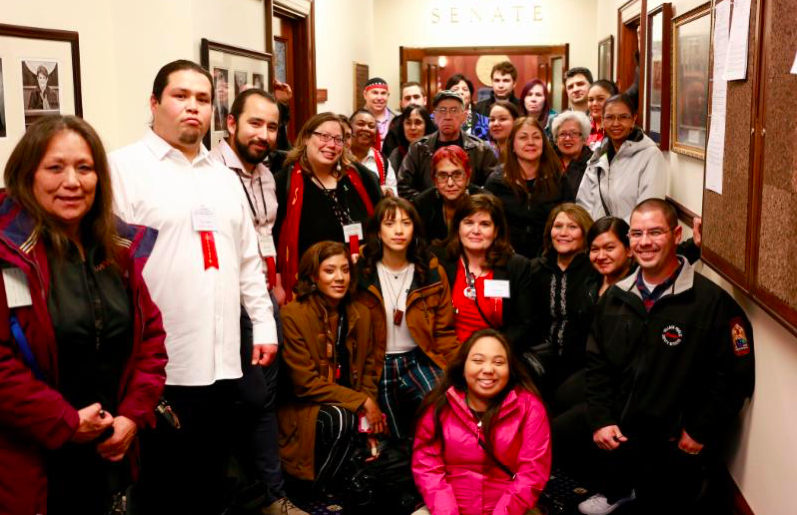
Rep. Daniel Ortiz of Ketchikan, a member of the Democrat-led majority introduced HCR 19 this session to declare the linguistic emergency.
The declaration would set the state up to to budget funds that would be used to preserve the languages, although it’s unclear how such money would be made available, since the bill has a fiscal note of zero.
Likely, the next step would be to introduce a law that requires the dying languages be taught in public schools.
The movement started back in 2014, when Rep. Jonathan Kreiss-Tompkins got a bill passed that added 20 Native languages as official languages of Alaska. That bill also drew a Native-led sit-in that lasted 15 hours in the Capitol.
Official Alaska languages include Inupiaq, Siberian Yupik, Central Alaskan Yup’ik, Alutiiq, Unanga, Dena’ina, Deg Xinag, Holikachuk, Koyukon, Upper Kuskokwim, Gwich’in, Tanana, Upper Tanana, Tanacross, Hän, Ahtna, Eyak, Tlingit, Haida, and Tsimshian. It was a start, language advocates said. There will be more to do.
The “more to do” is lined out in the HCR 19 sponsor statement from Rep. Ortiz:
“The state has moved in the right direction by acknowledging and recognizing the 20 Alaska Native languages as official languages of the state; however, recognition is just the first step. The intent of this resolution is to heed the suggestions put forth by the Alaska Native Language Preservation and Advisory Council (ANLPAC).
“The Council strongly urges that the Governor issue an Administrative Order, recognizing the linguistic emergency that exists, and state that it is the policy of the State of Alaska to actively promote the survival and continued use of all of Alaska’s 20 Native languages.
“In their 2018 Biennial Report to the Governor and Legislature, ANLPAC warned that all 20 Alaska Native languages are in crisis, and most are predicted to become extinct or dormant by the end of the 21st century. The State of Alaska can no longer sustain these rates of language loss unless policy changes are enacted that support people who are learning and speaking Alaska Native languages throughout the state.
“The loss of language represents the loss of a critical piece of our history, culture, and a traditional way of life. I respectfully request the Legislature join me in support of ANLPAC and the languages that represent intergenerational knowledge.”
The bill is now in Senate Rules and is scheduled for a Monday vote on the floor.
[Read: The race to save Aramaic, the language of Jesus]
Hirsch argued that a rape disaster declaration can have the same effect as the opioid disaster declaration — freeing up more money from the federal government.
WATCH FOR NEEDLES, STATE SAYS
Meanwhile, the Department of Health and Social Services is responding to the opioid disaster by not only getting overdose medication into the hands of drug users, but by issuing an unusual warning, telling Alaskans to watch for hypodermic needles during their spring cleanups.
Your local melting snow berm is part of this declared disaster zone. It likely doesn’t just have empty booze bottles and mounds of dog poop — there are needles to watch for, as this HSS poster warns. In future years, due to the linguistic emergency, we will see posters like this in the 21 different official language of Alaska, but for now, it’s in English and in pictures:

